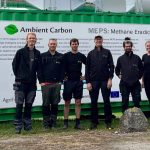Tag Archives methane

Nestle quits global alliance on reducing dairy methane emissions

Nestle quits global alliance on reducing dairy methane emissions

Danish start-up posts impressive results on enteric methane extraction at the barn
Greenhouse gas removal technology will be installed at large Indiana dairy

Kiwi startup promises methane vaccine for cattle
New Zealand company in running for investment in emission-reducing treatment for livestock

$7.9 million cattle research project aims to find rumen efficiencies
Cross-Canada project to reduce methane production will be led by UBC researcher

COMMENT: Bovaer is added to cow feed to reduce methane emissions. Does it get into milk and meat? Is it harmful for humans?

Study indicates methane emissions from dairy farms higher than previously thought

Atlantic ag emissions dropped slightly since 1990: report
Greenhouse gases from cattle, fuel oil dropped; nitrogen, diesel fuel emissions increased

First-of-its-kind cattle methane limiter approved for Canada
Bovaer feed additive already has stamp of approval in other countries

First-of-its-kind cattle methane limiter approved for Canada
Enteric methane emissions from cattle contributes 3.3 per cent of Canada’s total GHG emissions


